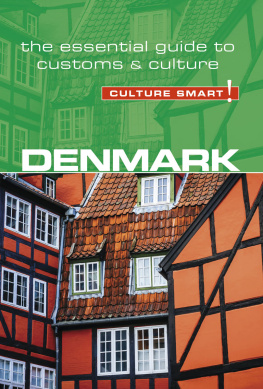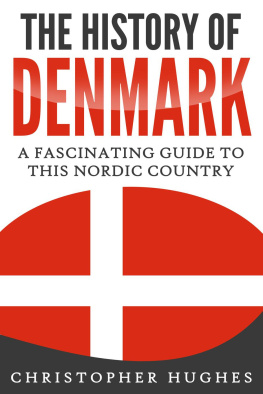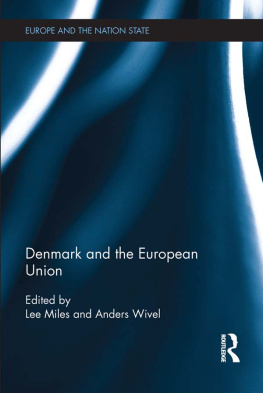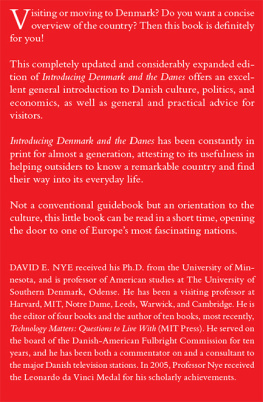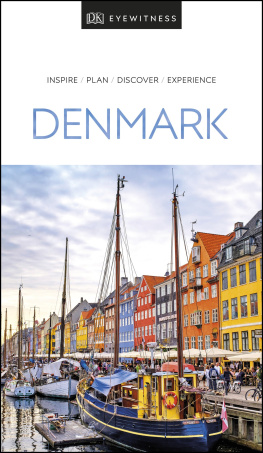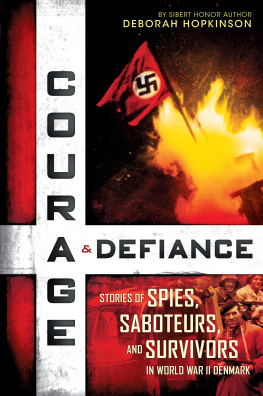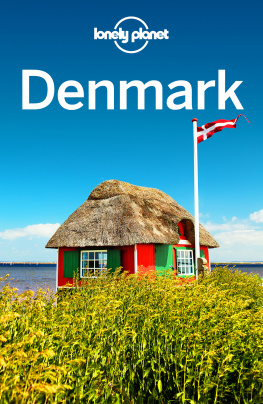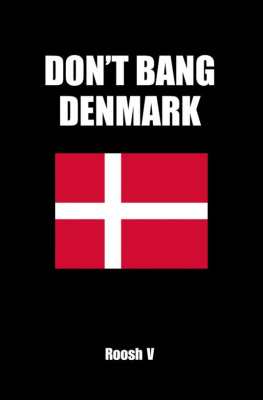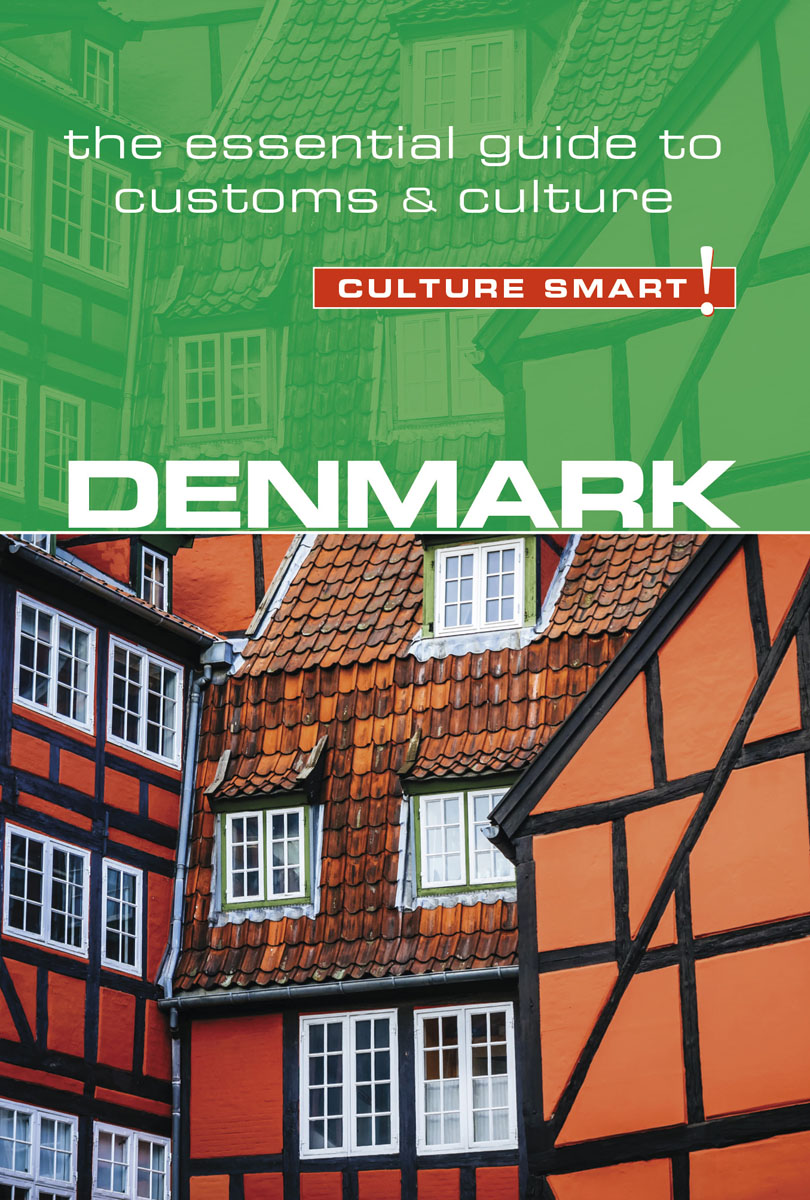
This book is available for special discounts for bulk purchases for sales promotions or premiums. Special editions, including personalized covers, excerpts of existing books, and corporate imprints, can be created in large quantities for special needs.
For more information ontact Kuperard publishers at the address below.
ISBN 978 1 85733 884 3
British Library Cataloguing in Publication Data
A CIP catalogue entry for this book is available from the British Library
All rights reserved. No part of this publication may be reprinted or reproduced, stored in a retrieval system, or transmitted in any form or by any means without prior permission in writing from the publishers.
First published in Great Britain
by Kuperard, an imprint of Bravo Ltd
59 Hutton Grove, London N12 8DS
Tel: +44 (0) 20 8446 2440 Fax: +44 (0) 20 8446 2441
www.culturesmart.co.uk
Inquiries:
Series Editor Geoffrey Chesler
Design Bobby Birchall
Printed in India
Cover image: Traditional timber-framed houses in Copenhagen. Shutterstock
Attribution 2.0 Generic (CC BY 2.0): Sebastiaan ter Burg.
Attribution-ShareAlike 2.0 Generic (CC BY-SA 2.0): Maria Eklind.
Attribution-NoDerivs 2.0 Generic (CC BY-ND 2.0): Charly W. Karl
Creative Commons Attribution-Share Alike 3.0 Unported: Nationalmuseet, Roberto Fortuna and Kira Ursem
Creative Commons Attribution-Share Alike 4.0 International: Leif Jrgensen.
CC0 Creative Commons: SueofNY.
Public Domain:
About the Author
MARK SALMON grew up in Ireland, where he practiced law for ten years; he also has an M.A. in English Literature from the National University of Ireland. He emigrated to Denmark in 1999 and, after teaching English and English Law there for fifteen years, he joined a large international shipping company in Copenhagen as Legal Counsel, a position that he still holds. He has traveled extensively in Denmark, Europe, America, and Africa.
The Culture Smart! series is continuing to expand. All Culture Smart! guides are available as e-books, and many as audio books.
For the latest titles visit
www.culturesmart.co.uk
The publishers would like to thank CultureSmart! Consulting for its help in researching and developing the concept for this series.
CultureSmart! Consulting creates tailor-made seminars and consultancy programs to meet a wide range of corporate, public-sector, and individual needs. Whether delivering courses on multicultural team building in the USA, preparing Chinese engineers for a posting in Europe, training call-center staff in India, or raising the awareness of police forces to the needs of diverse ethnic communities, it provides essential, practical, and powerful skills worldwide to an increasingly international workforce.
For details, visit www.culturesmartconsulting.com
CultureSmart! Consulting and CultureSmart! guides have both contributed to and featured regularly in the weekly travel program Fast Track on BBC World TV.
contents
Map of Denmark

introduction
Mention Denmark to most people, and they will think of Viking raiders with horned helmets, looting and pillaging their way across Europe. Others may think of one of Denmarks more famous exportsCarlsberg beer, or the fairy tales of Hans Christian Andersen. But of the Danes themselves they will probably know very little. While there seems to be a cultural stereotype of the Swedesoversexed, liberal, and speaking with a funny accentthere isnt one of the Danes. As a result our image of Denmark and the Danes seems to be based largely on what we know of the Swedes. The Danes seem to have become lost in a general Scandinavian cultural snapshot, rather like a little boy at the back of the crowd in a wedding photograph.
One of the purposes of this book is to set the record straightto help show the visitor to Denmark that there indeed is a difference between the Danes and their better-known Scandinavian cousins on the other side of the resund. This is a book for people about people. It aspires to give you an insight into who the Danes really are, and what makes them tick. It will inform you about their history and geography, and of the roles these have played in forming the Danish national character. It will reveal what is behind the way that Danes behave in their daily lives. You will be introduced to the Danish idea of Jante, and its significance in modern Danish society.
You will gain an insiders perspective on Danish family life and the Danish home. You will also see how a little knowledge of Danish attitudes and values can help in meeting and doing business with the Danes. Not only will you learn something of the way in which Danish business works, but there are also many practical tips on how to conduct yourself and what to expect in different situations.
This talented, industrious people have made important contributions to European and world culture. They have created a social model that has been the envy of some and is an example to many, and are justifiably proud of their achievements. It is hoped that, armed with this guide, you will be able to avoid some of the social and cultural pitfalls that foreign visitors are bound to encounter, and that you will get to know and appreciate the Danish people more deeply. While the Danes may be difficult to get to know, they are a friendly, fair-minded, and civilized people who are most certainly worth knowing.
Key Facts
Official Name | The Kingdom of Denmark | Danish: Kongeriget Danmark |
Capital City | Kbenhavn (Copenhagen) |
Main Cities | Copenhagen, Odense, rhus, lborg, Esbjerg |
Area | 16,639 sq. miles (43,094 sq. km) | 54.02% arable land, 0.19% permanent crops, 45.79% other |
Climate | Temperate; humid and overcast; mild, windy winters and cool summers |
Currency | Danish krone (pl. kroner). In 2018, DKk 6.62 = 1 USD DKk 8.59 = 1 GBP | Though Denmark refused to join the Eurozone, the Danish krone remains pegged to the Euro. |
Population | 5.79 million | Average life expectancy is 81.2 years. |
Ethnic Makeup | Scandinavian (86.7%) | Inuit, Faroese, German, Turkish, Iranian, Somali |
Family Makeup | The average number of children per family is 1.73. |
Language | Danish. English has been taught in schools for the past 50 years. | German and French are taught as third languages. |
Religion: | The State Church is the Danish Folkekirke, or Peoples Church. | Evangelical Lutheran 76%, Muslim 4%, other 20% |
Government | Constitutional monarchy, parliamentary democracy. The monarch has no political power. There is a unicameral Peoples Assembly or Folketinget (179 seats, incl. 2 from Greenland and 2 from the Faroe Islands). Members elected by proportional representation to serve four-year terms. |
Next page
